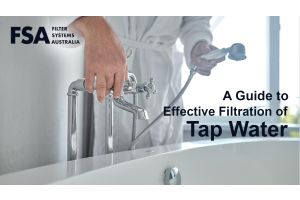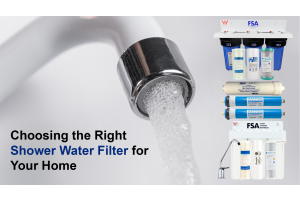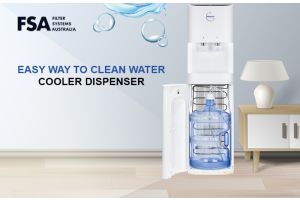With an excess of plastic already in use, it’s high time to say goodbye to water bottles and add a portable water filter to your packing list for travelling. Not only is it considered a great option to reduce waste, but it also seeps out metal, bacteria, viruses, and more to turn any water source into drinkable water.
Be it technology or regular things like food or water, portability has certainly become a crucial element in our day-to-day lives, especially when it comes to hiking/ camping or travelling to the backcountry that lack usual necessities.
Since clean drinking water is not accessible everywhere, it is essential to have the best portable water filter alongside, especially when you are going for an outdoor activity for the first time and thinking of relying on nearby lakes or streams for drinking water. Such situations call for a smart solution that will not only satisfy your thirst drive with filtered and clean water but also help you avoid health risks.
While keeping water bottles when heading for an outdoor expedition is considered more convenient by many, a portable water filter can be your most reliable source of drinking water throughout a camping jaunt. At FSA, we have pulled together a few points that deliver better information to people who are planning to go for hiking and are looking for ways to consume clean drinking water.
In this blog, we’ll talk about the following.
- A look at the difference between water filters and water purifiers
- How water filters and purifiers work?
- Why use a portable water filter?
- Type of portable water filters
- Methods of purification
- Things to consider while buying a portable water filter
First off, it’s important to have a clear understanding about the main difference between water filters and water purifiers, and how both works.
Water Filters vs Water Purifiers
The one important thing that differentiates the two is the size of the microorganism each combat. A water filter works by physically straining out sediments, cysts and bacteria.
A water purifier, on the other hand, protects you from nasty viruses, that are too tiny to be caught by a filter.
How Water Filter and Water Purifier Work?
Be it filters or purifiers, all water treatment include an internal element and cartridges that seamlessly catch debris, protozoa and bacteria, providing contaminant-free water.
Talking about the functioning of the purifier, it uses chemicals to combat viruses that are too small to be caught through filtration process and relies on ultraviolet light to treat the pathogens.
Many filters and purifiers include activated carbon in their elements as it is effective at removing unpleasant tastes and contaminants like pesticides and other industrial chemicals.
Why Use a Portable Water Filter?

While embarking on outdoor activities, consuming clean drinking water is one of the major concerns for many travellers. Regardless of where you are travelling, the need to drink clean and healthy water just can’t be emphasised more.
People embarked on hiking/camping trips are likely to fill their bottles from roadside taps, lakes or streams, being completely unaware of what that water might contain. There could be any potential pathogenic agents like bacteria, viruses, protozoa and larvae. Water in open sources also contains chemical pollutants which are detrimental to health. All these contaminants affect the odour, taste and general qualities of water. That’s why, to protect yourself from the contaminated water damage in an outdoor expedition, it’s best to bring along a portable water filter to eliminate any stress and hassle. The best part is these units are compact enough to fit in a backpack, light enough to not add to much load to your bag and most importantly, are efficient enough to clean water from any source you come across on your way.
All in all, owing to their effectiveness and convenience, portable water filters are considered one of the most essential components in most emergency aid or survival kits.
Types of Portable Water Filters
While searching the best portable water filter in the market, you’ll come across varied types that are specifically designed by manufacturers to ease outdoor excursions. Let’s take a look at a few popular filters that are easily available in the market and are popular amongst people are mentioned further down.
Pump Filters
Pump filters are larger in size but still compact enough to fit into your backpack.
To use the filter properly, you have to connect one end of the pipe into your source (the lake or stream from where you are pulling out the water) and the other into the water bottle. You are all ready to take a sip of clean and bacteria-free water.
Gravity Filters
These kinds of filters usually consist of two containers where gravity pulls the water from one (through the filter) into the second to provide fresh water. These containers are hangings bags with attachable pipes.
Ultraviolet Filters
This type of filter usually counts on batteries, so its usage amongst people while hiking/ camping is comparatively less than the others. Talking about the advantage, however, this filter offers quick functioning and is effective enough to kill bacteria.
Straw Filters
Due to its light weight and user-friendliness, this portable water solution’s popularity amongst people is rising high day by day in the market. Unlike UV filters, this one does not require any batteries when used and eliminates all sort of debris and dust from the water source.
Bottle Filters
These filters include a straw filter cartridge fitted inside the bottle which can be removed once the dirt is removed from the water. When you are sure your water source is safe and healthy, you can use the bottle as a normal drinking water bottle.
Method of Purification
Reverse Osmosis
This method forces water through a membrane of small pores that don’t allow the contaminants or pathogens to pass through. Once the water is filtered, it is clean and safe to drink.
At FSA we offer compact, easy to use portable reverse osmosis water filter systems that are equipped with an Alkaline filter which eliminates the need for additional cartridges at extra costs.
Boiling
One of the easiest and cheapest ways to purify water is to boil the contaminated water for about 1 to 3 minutes which kills harmful parasites and bacteria present in it.
Water treatment is important to maintain your health and avoid getting sick while travelling. Aim for a flowing source rather than stagnant water as it is likely to be less infested.
Things to Consider When Buying a Portable Water Filter
Now when you know the varied filter types and purification methods, you have sure gained some clarity about portable filters.
Furthermore, when buying a portable filter, there are a few things that need to be clear in the beginning to ensure a profitable purchase.
Size/Weight
You already have so much on your back while going for hiking or travelling and the weight of a water filter is going to add to it. That’s why take the size of the filter into consideration before choosing a brand or model.
There are many small, compact and relatively easy-to-fit filters available in the market, but every model’s weight depends on the materials and type of filtering technology used.
Filtering Bacteria/ Parasites
While most filters are designed to remove bacteria, sediments and protozoan cysts, there are only a few that can successfully filter viruses and parasites.
Before investing in a portable filter, be clear about the activity you wish to carry out and decide accordingly which one you want to go for.
Filtration Speed
Many people think that the filtration speed of all portable filters is usually the same which leads them to invest in just about any filter and regret later.
The filtration speed of each portable filter is distinct. While some produce about 20 ounces of clean water within a minute, others may struggle to produce even a few ounces in the same time frame. So, be aware of the speed of the portable filter you intend to buy and pick the one that takes less time to purify a large amount of water without any hassle.
Maintenance/ Cleaning
It’s a no-brainer that in order for a filter to function for a long time, you need to pay attention to its cleaning and cartridge replacement.
Filters without proper maintenance and cleaning cannot go far in terms of providing filtered water, resultantly losing their efficiency.
Usage
Rather than doing the things on your own, it’s better to take reference from the how-to guide that comes with most portable filters. Simply following the instructions can help avoid hassle and inconvenience and give you a better understanding of filter usage.
If you clearly understand the points mentioned above, you’ll able to buy the best portable filter for your needs. Having an appropriate portable water filter will certainly minimise your chances of acquiring any waterborne diseases.
Key Takeaway
All in all, portable water filters are not only helpful in quenching your thirst in the wild but are lightweight and durable enough to help you reach your destination without being dehydrated and tired of any extra burden.
So, the next time you plan to go out for a trek, make sure to carry a portable water filter to save yourself from drinking contaminated water. Each of the aforementioned type can be installed and primed with ease to transform all sources of fresh water into clean portable water.
To pick the best portable water filter for your needs, think of how you are going to use it. For example, if you are an urban explorer you might be better off buying a small model, but if you are more into camping, choose a model that offers a better filtering rate.




